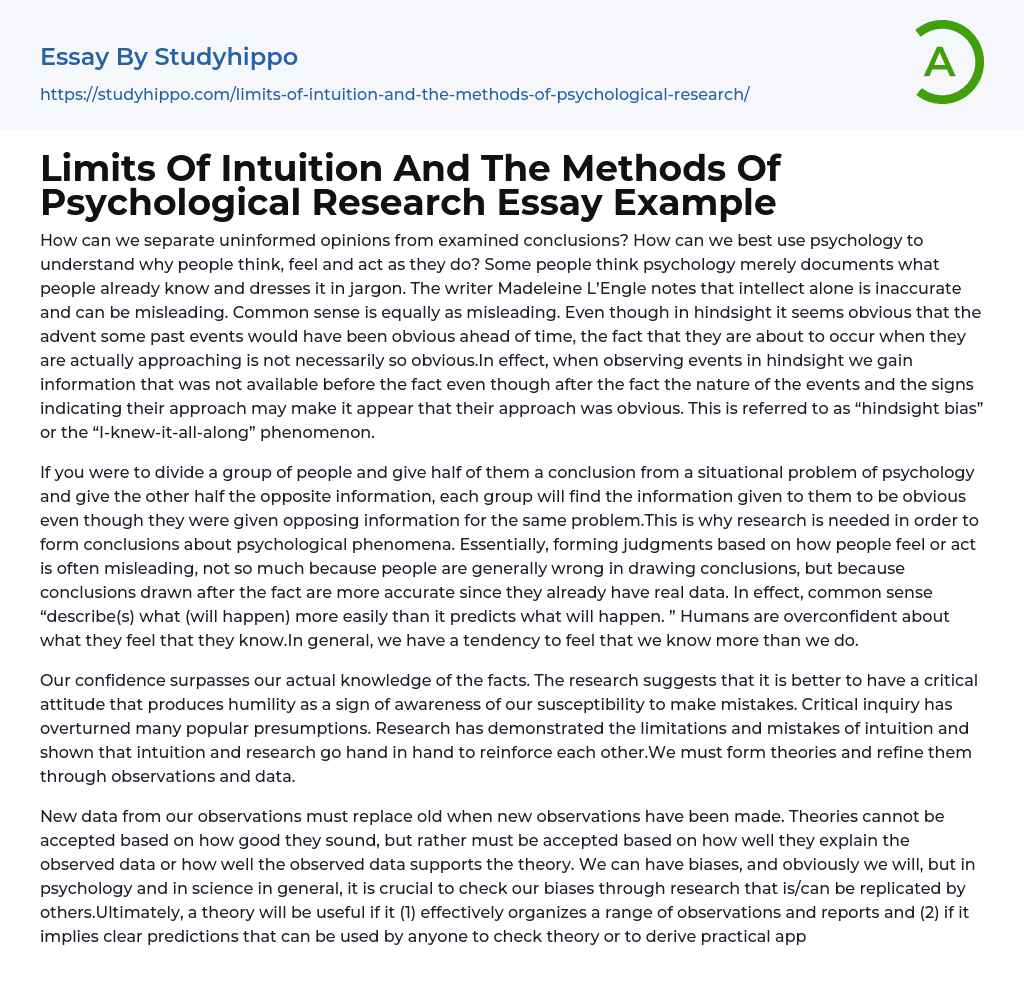

Limits Of Intuition And The Methods Of Psychological Research Essay Example
How can we separate uninformed opinions from examined conclusions? How can we best use psychology to understand why people think, feel and act as they do? Some people think psychology merely documents what people already know and dresses it in jargon. The writer Madeleine L’Engle notes that intellect alone is inaccurate and can be misleading. Common sense is equally as misleading. Even though in hindsight it seems obvious that the advent some past events would have been obvious ahead of time, the fact that they are about to occur when they are actually approaching is not necessarily so obvious.In effect, when observing events in hindsight we gain information that was not available before the fact even though after the fact the nature of the events and the signs indicating their approach may make it appear that their approach was obvious.
...This is referred to as “hindsight bias” or the “I-knew-it-all-along” phenomenon.
If you were to divide a group of people and give half of them a conclusion from a situational problem of psychology and give the other half the opposite information, each group will find the information given to them to be obvious even though they were given opposing information for the same problem.This is why research is needed in order to form conclusions about psychological phenomena. Essentially, forming judgments based on how people feel or act is often misleading, not so much because people are generally wrong in drawing conclusions, but because conclusions drawn after the fact are more accurate since they already have real data. In effect, common sense “describe(s) what (will happen) more easily than it predicts what will happen. ” Human
are overconfident about what they feel that they know.In general, we have a tendency to feel that we know more than we do.
Our confidence surpasses our actual knowledge of the facts. The research suggests that it is better to have a critical attitude that produces humility as a sign of awareness of our susceptibility to make mistakes. Critical inquiry has overturned many popular presumptions. Research has demonstrated the limitations and mistakes of intuition and shown that intuition and research go hand in hand to reinforce each other.We must form theories and refine them through observations and data.
New data from our observations must replace old when new observations have been made. Theories cannot be accepted based on how good they sound, but rather must be accepted based on how well they explain the observed data or how well the observed data supports the theory. We can have biases, and obviously we will, but in psychology and in science in general, it is crucial to check our biases through research that is/can be replicated by others.Ultimately, a theory will be useful if it (1) effectively organizes a range of observations and reports and (2) if it implies clear predictions that can be used by anyone to check theory or to derive practical applications. In the end, research will generally lead to revised theories that improve on how we organize and predict what we understand about the world around us.
If we are really to gain an understanding of psychology, it will be necessary to resort to rigorous science that provides answers to questions regarding the nature of the field and the issues psychologists pursue. We
can only take speculations so far.
- Abnormal Psychology essays
- Social Psychology essays
- Developmental Psychology essays
- Jean Piaget essays
- Positive Psychology essays
- Classical Conditioning essays
- Counseling essays
- Psychoanalysis essays
- Educational Psychology essays
- Behaviorism essays
- Authority essays
- Operant Conditioning essays
- Maslow's Hierarchy Of Needs essays
- Mental Health essays
- Personality Psychology essays
- Psychotherapy essays
- Family Therapy essays
- Stanford Prison Experiment essays
- Abraham Maslow essays
- Erik Erikson essays
- Cognitive Psychology essays
- Sigmund Freud essays
- Attachment Theory essays
- Supersize Me essays
- Individual essays
- Infant essays
- Childhood essays
- Adolescence essays
- Growth Mindset essays
- Is Google Making Us Stupid essays
- Childhood Memory essays
- Positive Attitude essays
- Reinforcement essays
- Archetype essays
- Maturity essays
- Deception essays
- Certainty essays
- Conformity essays
- Aggression essays
- Behavior essays
- Human Behavior essays
- Obedience essays
- Adult essays
- Procrastination essays
- Morality essays
- Altruism essays
- Human Sexuality essays
- Role Model essays
- Perseverance essays
- Expressive essays



